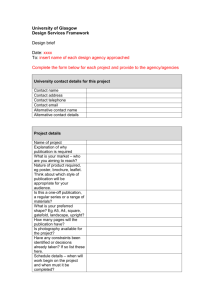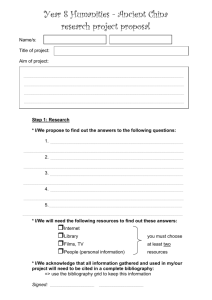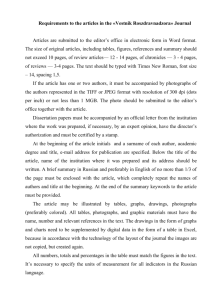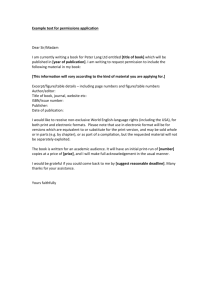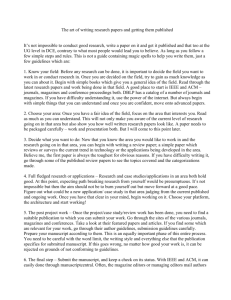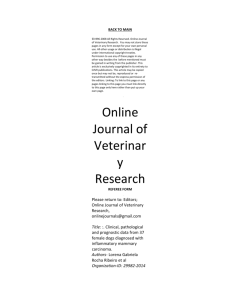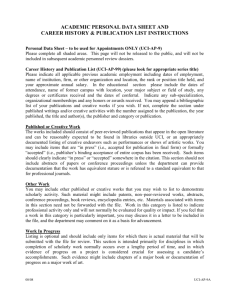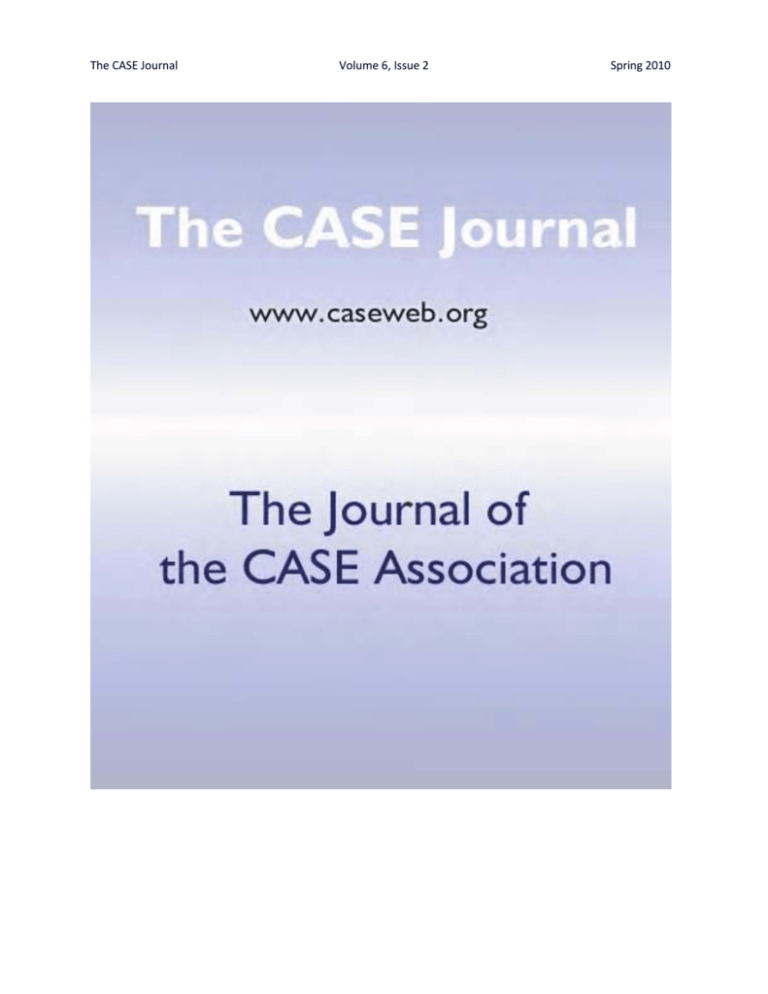
The CASE Journal Volume 6, Issue 2 Spring 2010 The CASE Journal ~ Volume 6, Issue 2 (Spring 2010)
Table of Contents
In order to access full cases you must be a current member of the CASE Association.
Editorial Policy
Letter from the Editor
List of Review Board Members and Ad Hoc Reviewers
Case Abstracts
Cases ‐ In order to access full cases you must be a current member of the CASE Association.
“Rebranding the Leper Colony: Challenges of Changing Culture and Managing Difficult
People,” Allison Kipple, Joe S. Anderson, Jack Dustman, and Susan K. Williams,
Northern Arizona University
“Judy’s Defense: One Workplace Bully Is One Too Many,” Andra Gumbus, Christopher
C. York, and Carolyn A. Shea, Sacred Heart University
“Philosopher’s Wool Co.: SME Sustainable Supply Chain Management in the Global
Economy,” Miriam F. Weismann, Suffolk University
“Privatization in the Last Frontier,” LeAnn Beaty, Eastern Kentucky University
Critical Incident
“Competing for New York’s Best Lobster Roll: Failed Trade Protection”
David E. Desplaces, College of Charleston
Roxane M. Delaurell, College of Charleston
Laquita C. Blockson, College of Charleston
Membership Form
EDITORIAL POLICY
The audience for this journal includes both academics and practitioners and thus encourages
submissions from a broad range of individuals.
The CASE Journal invites submissions of cases designed for classroom use. Cases from all
business disciplines will be considered. Cases must be factual, and releases must be available
where necessary. All cases must be accompanied by an instructors’ manual that identifies the
intended course, relevant theoretical concepts or models that can be applied, and the research
methodology for the case. The instructors’ manual should also contain discussion questions with
suggested responses and a teaching plan if not inherent in the Q&A.
The CASE Journal also invites submissions of articles relating to case teaching, case writing,
case reviewing, and similar topics. Conceptual papers and papers reporting original research as
well as the applied implications of others' research in terms of case teaching, research, and
instruction are welcome, as are creative learning, research and writing methods that have been
tested in the classroom or in practice, including critical incidents and industry or technical notes.
Because of the broad appeal of the journal to practitioners and academics, The CASE Journal
will not refuse to review a case or an article solely on the basis of format. However, if a case or
paper is accepted, the final version for publication will be expected to adhere to the publication
and manuscript guidelines. Cases and papers may be returned due to issues relating to writing
style and grammar; please use a grammar- and spell- checking tool prior to submission.
The CASE Journal encourages authors to submit often to the Journal. However, authors who are
identified as the primary author published in one publication year will not be published a second
time in that same publication year. Rather, additionally accepted papers will appear in
subsequent publication years. This policy does not apply to authors who submit papers for
review with different second authors from those on the first accepted paper in any given
publication year.
CASES: Those wishing to submit a case for potential publication should submit the entire case
along with the completed instructors’ manual for review. If accepted for publication, only the
case will be published along with a note for interested readers to contact the case author for the
teaching notes. Cases will be reviewed and published using the same general rules that apply
other scholarly articles. The author must submit a signed letter of liability release prior to the
publication of a case. Authors are responsible for distributing the instructors’ manual as
requested.
INITIAL SUBMISSION:
All cases and articles will be subject to a double blind developmental review process. Our
reviewers will offer suggestions for improvement and revision, where appropriate. All
manuscripts submitted are to be original, unpublished and not under consideration by any other
publishing source. To ensure the blind review, there should be no author-identifying information
in the text or references. An abstract of 150 words or less should accompany any article, and
should be included in the instructors’ manual accompanying any case. This journal will only
accept on-line submissions. Send one (1) copy to the editor by e-mail in an MS-Word document
(.doc not .docx). A separate title page must accompany the paper and include the title of the
paper and all pertinent author information (i.e. name, affiliation, address, telephone number,
FAX number, and e-mail address). If any portion of the manuscript has been presented in other
forms (conferences, workshops, speeches, etc.), it should be so noted on the title page.
COPYRIGHT:
Authors submitting articles and cases for potential publication in The CASE Journal warrant that
the work is not an infringement on any existing copyright and will indemnify the publisher
against any breach of such warranty. Upon acceptance for publication, authors must convey
copyright ownership to The CASE Journal by signing a publication agreement, signed and dated
by all authors, which also certifies that the article/case is original, not published elsewhere, and
that they have permission to use all proprietary and/or copyrighted material.
Cases published in The CASE Journal and their instructors’ manuals are distributed through the
Primis Online and ecch distribution networks.
Please see the FAQ on www.caseweb.org for formatting guidelines for accepted cases.
CIRCULATION DATA:
Reader:
Frequency of Issue:
Copies per Issue:
Subscription Price:
Publishing Fee:
Sponsorship:
Academic and Practitioner
2 times per year (Fall and Spring, based upon available accepted
manuscripts)
n/a Internet publication
Free with membership in The CASE Association
None. However, at least one of the publishing authors must be a member
of the CASE Association at the time of publication ($25 membership fee)
Professional Association
©2010 The CASE Association. All right reserved. Further reproduction by any means, electronic
or mechanical, including photocopying or by any information storage or retrieval system must be
arranged with the copyright holder. If you wish to use any of these cases in your classes, you can
arrange for their purchase through our distributors: PRIMIS (www.primisonline.com) or ecch
(www.ecch.com). Copyright law prohibits you from reproducing any cases without permission
EXCEPT cases you have written.
From the Editor
April 2010
Crystal Ball Questions and Assumptions of Knowledge
Series: Our Gal Sunday
Show: Episode 3439
Date: Jun 05 1950
ANNOUNCER:
(COLD) Once again we present "Our Gal Sunday"...the story of an orphan girl named
Sunday...from the little mining town of Silver Creek, Colorado. Who in young womanhood
married England's richest, most handsome lord...Lord Henry Brinthrope. The story that
asks the question...Can this girl from a little mining town in the West find happiness
as the wife of a wealthy and titled Englishman?
Try listening for a few minutes at: http://xroads.virginia.edu/~1930s2/radio/day/1145am.html
Some of you may remember hearing “Our Gal Sunday” on the radio or hearing older relatives
reminisce about it and other entertaining remnants of the good ol’ days, such as burning leaves in
the backyard and playing stickball in the street. By the way, these are the same relatives who
walked to school in the snow barefoot, uphill both ways. Those days are over, thankfully, but
Our Gal Sunday survives with a new name: Our Casewriter in a Hurry…the story of a casewriter
from a little school in the East (or West) who has a story to tell…overcome with enthusiasm for
the case form, our Casewriter begins to write and write and write until…the daunting Instructor’s
Manual looms ahead.
This story asks the question…Can this casewriter from the little school in the East (or West) find
a way to tease out learning from a case and share the methodology through the IM? Or will the
Casewriter founder and fall into the abyss of Crystal Ball Questions and Assumptions of
Knowledge?
This year, I have read more cases than I could have imagined I would ever do, and these two
problems cropped up more than any other (except the difficulty that people have exhibited in
writing in the past tense). These problems appear because of our intense desire to exploit “the
teachable moment” and use what we DO know to infer that which we can only guess at.
Crystal Ball Questions
Crystal Ball Questions is my name for all those questions that have no answers. At least,
not answers grounded in facts from a case. Some examples:
o What will the CEO do?
o How much profit will result from the introduction of a new product?
o How popular will the new ISP be?
o Why did the manager behave as she did?
These are interesting questions. Unfortunately, we would have to be mind readers to
answer some of them and seers to answer the others. There are no facts, either in a case
itself or available on the Internet, that will tell us the future. There is no way we can be
inside the head of any of the characters in our cases to explain their motivations or
actions. I know this and you know this. So why do we succumb to the temptation to ask
questions like these? The “why” of this rhetorical question is far less important than
developing a method for avoiding our tendency to slip into fortune telling. Here is what I
suggest. Sometimes, I even remember to do this myself.
Make a list of the questions you want to ask about your case. Do not answer them yet.
Take the list to school and ask one of your colleagues what information is needed to
answer the questions. (If you can get your students to do this, so much the better). Then,
take that list of elements back to your case and make sure that they appear in the case
somewhere. If they do not, and you cannot fit them in comfortably, change the question.
You can rewrite these same questions as I have done below to make them answerable by
the mortals who use our cases:
o If you were the CEO, what would you do? Why?
o What is the potential profit that could result from the introduction of the new
product? How would you calculate this forecast?
o How can you measure the potential popularity of the new ISP? What data would
you look for? Where can you find it?
o What are some potential reasons that the manager behaved as she did? Support
your answers with theory.
Suddenly, the student answers become richer, the learning becomes clearer and easier to
identify, and the transferability of the response is improved greatly.
Assumptions of Knowledge
We tend to believe that everyone else knows what we know. After all, it’s obvious to us!
It’s easy to forget how many facts we have accumulated in the dusty file cabinets of our
minds, how many impressions we have stored in mental zip-loc bags, and how much
inadvertent analysis we have done in the process of writing cases.
Some of our analysis may slip into the case, only to succumb to editorial “blue penciling”
later. More often, we simply overlook certain facts that have become obvious to us, and
we exclude them from the case narrative. These facts are not obvious to the reader,
however, and our omitting them results in a case that requires the reader to make many
inferences, justifiable or not. It becomes difficult to analyze a case properly if important
facts are missing or if observed behaviors are not reflected in the case descriptions. For
example, why do you know that the CEO behaves in a certain way but claims to support a
corporate mission/philosophy that lends itself to a different type of behavior? You only
know this because the casewriter took the time to record the action thoroughly. This bit of
knowledge has an impact on the way you read the rest of the case and, subsequently,
perform the analysis.
I am particularly prone to making leaps of faith and assuming that everyone else is
following me. Unfortunately, when I turn to glance behind me, all I see are people
scratching their heads and looking quizzically at the results of my mental gymnastics.
The easiest way to avoid leaving salient facts out of your cases, is to have a colleague
read the case and answer your discussion questions. If your colleague cannot answer the
questions because of missing facts, that’s a clear sign that you have some work to do.
Does it sound to you like you are leaning very heavily on your colleagues? That you are
depending on them to keep the quality of your case work high? Of course you are, and
that’s as it should be. Casewriting is not a solitary and lonely process; it is a social one,
and one well accomplished in the company of others. And, in the process, we keep one
another “honest!”
The cases in this issue of The CASE Journal are a diverse group; you will certainly find
something to use in your own teaching here. I’m very pleased to announce the publication of our
first Critical Incident, Competing for New York’s Best Lobster Roll: Failed Trade Protection
(David E. Desplaces, Roxane M. DeLaurell, Laquita C. Blockson). If you are teaching small
business management/entrepreneurship, you may find this short case very helpful in illustrating
the concept of intellectual property and its protection.
The next two cases focus on dysfunctional behavior in organizations. The team of Allison
Kipple, Joe S. Anderson, Jack Dustman, and Susan K. Williams leads us through the difficult
process of organizational culture change in a highly regulated work environment in Re-Branding
the Leper Colony: Challenges of Changing Culture and Managing Difficult People. They are
followed by another team: Andra Gumbus, Christopher C. York, and Carolyn A. Shea offer
Judy’s Defense: One Workplace Bully Is One Too Many, which deals with the much-publicized
current issue of bullying in organizations. Both these cases have a sub-text of gender bias along
with their primary content trajectories. Are your students denying the existence of gender bias
because of their current enlightened status as college students? These two cases will help them to
think again about workplace behaviors.
The two cases that follow take a macro economic perspective. Beginning with Privatization in
the Last Frontier, LeAnn Beaty examines the process of contracting out correctional facilities in
Alaska and challenges students to analyze competing objectives and values. Miriam F.
Weismann looks at socially responsible business and supply chain in her case, Philosopher’s
Wool Co.: SME Sustainable Supply Chain Management in the Global Economy. Is social
entrepreneurship in conflict with business success? Difficult issues in challenging economic
times can make socially responsible decision-making even more challenging.
Gina Vega
Editor
The CASE Journal Review Board
Review Board
James Carroll, Georgian Court University
Charles M. Carson, Samford University
Tom Leach, University of New England
Rebecca Morris, University of Nebraska at Omaha
William Naumes, University of New Hampshire
Stefanie Tate, University of Massachusetts-Lowell
The CASE Journal Ad Hoc Reviewers, 2009-2010
Margaret Ake, Endicott College
LeAnn Beaty, Eastern Kentucky University
Robert Blanchard, Salem State College
Lou Chin, Bentley University
Debra Comer, Hofstra University
Edward Desmarais, Salem State College
David Desplaces, College of Charleston
Collette Dumas, Suffolk University
Timothy Edlund, Morgan State University
David Goodof, Salem State College
Elizabeth Haran, Salem State College
Monika Hudson, U. of San Francisco
Marcus Hurt, EDHEC (France)
Stephanie Hurt, Meredith College
Kristine Kelly, Endicott College
Lorri Krebs, Salem State College
Sanjay Kudrimoti, Salem State College
Miranda Lam, Salem State College
Laurie Levesque, Suffolk University
Kathi Lovelace, University of Idaho
Daphne Main, Loyola University
Saverio Manago, Salem State College
Michael Merenda, U. of New Hampshire
Jean Meyer, Loyola University
Margaret Naumes, U. of New Hampshire
Dan Reid, University of New Hampshire
Marie Rock, Bentley University
Dianna Ross, Concord University
Christine Shea, U. of New Hampshire
Herbert Sherman, Long Island University
Judy Spain, Eastern Kentucky University
Ram Subramanian, Montclair State U.
Marilyn Taylor, U. of Missouri – Kansas
City
Miriam Weismann, Suffolk University
Michael Welsh, U. of South Carolina
Susan Williams, Northern Arizona U.
Elizabeth Wilson, Suffolk University
Phillip Wilson, Midwestern State University
I’d like to take this occasion to thank the Review Board and the Ad Hoc Reviewers for their
valuable service to The CASE Journal and to their case writing peers. They are the “keepers of
quality” for the journal; without their input, we could not publish. Their service often goes
unrecognized because it is behind the scenes. I am happy to remind everyone of the extensive
work that our colleagues volunteer to our continuing development and to student learning.
CASE AND ARTICLE ABSTRACTS
Volume 6, Issue 2 (Fall 2010)
In order to access full cases you must be a current member of the CASE Association.
Rebranding the Leper Colony:
Challenges of Changing Culture and Managing Difficult People
Allison Kipple, Joe S. Anderson, Jack Dustman, and Susan K. Williams
Northern Arizona University
Anika, a new manager, is confronted by a dysfunctional organizational culture characterized by
employee disrespect, insubordination, and low performance. Her charge is to “to turn the place
around”. The case takes place in a service organization, a testing range run by the US
Department of Defense. The staff is a combination of federal and contract employees who test
clients’ high-tech systems in a sometimes dangerous, desert environment.
In addition, there are three vignettes that give a portrait of dysfunctional individual behaviors.
Frequently, the response students want to make is “I’d just fire the guy.” Unfortunately, it is not
so simple.
Key words: leadership, organizational change, dealing with difficult employees
Judy’s Defense: One Workplace Bully Is One Too Many
Andra Gumbus, Christopher York, and Carolyn A. Shea
Sacred Heart University
Judy was a high-performing professional manager who was with her company for 15 years and
was a manager for six. She was a confident, positive, and happy person but recently lost her
confidence in herself and her abilities. She dreaded going to work because she never knew what
she would face from her boss, Dennis. Dennis was a brilliant man who was recently promoted to
Senior V.P. He was condescending, and he humiliated people in public. Complaints to the CEO
and a harassment claim produced no results. Dennis did the CEO’s dirty work and served a role
needed in a fast-paced and profit-driven corporate culture. Judy enrolled in an MBA program to
build her resume and her self-confidence. She faced a critical juncture in her career. Should she
quit, transfer, complain to HR, or confront Dennis?
Key words: workplace bullying, harassment, workplace policy, managerial style, motivation,
culture, change management, individual rights, internal stakeholders
Philosopher’s Wool Co.:
SME Sustainable Supply Chain Management in the Global Economy
Miriam F. Weismann, Suffolk University
Small to medium-sized enterprises, SMEs, play a critical role in the global economy. They
comprise 90% of the global firm population and employ more than 50% of the labor force in the
private sector. This case study examines issues related to sustainable supply chain management
and social entrepreneurship in the SME context. Being small does matter and the efficiencies of
small to medium-sized companies struggling for competitive advantage in the global
marketplace warrants consideration. Philosopher’s Wool Co., located in Inverhuron, Ontario,
Canada, is a woolen producer and woolens product manufacturer that partners with other Ontario
wool producers and American wool processors and distributors. Its sustainable vertical supply
chain system increased local woolen farmers’ revenues contrary to the “conventional” price
wisdom in the Canadian woolen industry and turned by-product cost into profitable end use. It
also effected social change in its local business community and in global customer relations
through resource efficiency and socially responsible employee and consumer policies. However,
the struggle to maintain a foreign distribution network and remain competitive and profitable
was problematic. Students are challenged to solve the problems of an SME operating in a global
economy.
Key Words: sustainability, social entrepreneurship, vertical supply chain management
Privatization in the Last Frontier
LeAnn Beaty, Eastern Kentucky University
For 28 years Alaska, like the vast majority of the nation, has struggled with growing prison
populations and shrinking budgets. In 1995, the Alaska Department of Corrections, faced with
sanctions unless they ameliorated their crowded prison conditions, looked to the popular practice
of contracting out its correctional operations by sending 650 prisoners to a private out-of-state
prison. But, as the costs of prisoner litigation and transportation mounted, the state began to
consider building its own private prison, a decision which many state lawmakers and business
entrepreneurs argued would allow the state to stretch scarce dollars by providing cheaper and
better quality prisons, return millions of dollars to the state economy, and create permanent jobs.
In this decision case, students are required to put themselves in the role of the Alaska Legislature
to determine whether they should permit the building and operation of a private prison in one of
Alaska’s remote communities. The students must analyze and juggle the complex and often
competing set of objectives, values, and political tensions intrinsic to all privatization decisions.
Key words: privatization, corrections, private prisons, contracting out, ethics, public choice
theory
Critical Incident
Competing for New York’s Best Lobster Roll: Failed Trade Protection
David E. Desplaces, Roxane M. Delaurell, Laquita C. Blockson
College of Charleston
This critical incident offers students the opportunity to develop an understanding of the issues
associated with intellectual property (IP) law and the ways to protect a business from its
employees and potential unfair competition. Using a restaurant setting students can learn to apply
IP concepts, discuss the issues of trademark, as well as develop a legal IP check list.
Key words: Intellectual property, trade dress, trademark, restaurant, small business management,
hospitality management
The CASE Association
2010-2011 Membership Form
Please fill in the following information. Mail this form to the VP for Membership whose
name and address appear at the bottom of the page.
1. Salutations: □ Dr. □ Mr. □ Mrs. □ Ms. □ Prof. □ Other: ______
2. Name: __________________________________________________________
3. School: _______________________________________________________
4. Address: _____________________________________________________
______________________________________________________
5. City & State ___________________________________________________
6. Telephone #: ___________________________________________________
7. E-mail address: _________________________________________________
2010 DUES PAYMENT
__ I am enclosing my check for $25.00
Please make check payable to The CASE Association and mail to:
David Desplaces
College of Charleston
66 George Street
Charleston, SC 29424
Tate Center, Room 307
If you have questions, you may call (843.953.6446) or e-mail (DesplacesD@cofc.edu).
www.caseweb.org

